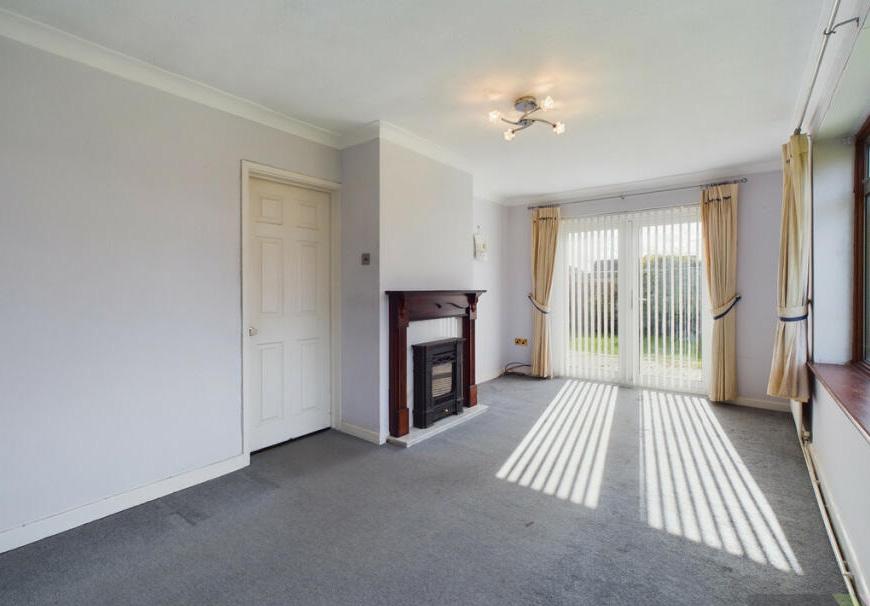

CONTENTS
BENEFITS OF BUYING A NEW-BUILD HOME
Is it time to consider a new-build?

SELLING A HOUSE WITH TENANTS
Our guide to help you navigate the process smoothly and efficiently.

HOW TO PREPARE FOR A HOUSE VIEWING
A comprehensive guide outlining the key steps to take before, during, and after a house viewing.

Welcome to our
magazine
The Spring Budget has passed, debunking press speculation about the property market. However, there was a notable adjustment in Capital Gains tax on property sales, dropping from 28% to 24%. The exemption for your own home is still in place and is not taxed. Encouragingly, there’s a forecast for sustained reduction in inflation throughout the summer, which bodes well for interest rates. It’s no secret that the market has been tough, but there is light at the end of the tunnel.
Inside this issue of Gateway, we look at the benefits of buying a new-built home, give you some advice if you’re a landlord selling a property with tenants inside, and help you prepare for a house viewing if you’re looking to get on the property ladder.
Enjoy!

 John Pring FNAEA(Honoured) & MARLA | Director
John Pring FNAEA(Honoured) & MARLA | Director


BENEFITS OF BUYING A NEW-BUILD HOME
Is it time to consider a new-build?
When it comes to purchasing a property, there are various options available, from historic houses to modern apartments. However, one increasingly popular choice among homebuyers is opting for a new-build home. These are properties that have been recently constructed, often as part of a larger development project. While the decision to buy a new-build home may vary depending on individual preferences and circumstances, there are several significant benefits associated with this choice.
MODERN DESIGN AND FEATURES
New-build homes in the UK are typically designed with contemporary aesthetics and modern features in mind. From open-plan layouts to energy-efficient appliances, these properties often incorporate the latest trends and technologies in home design. Buyers can enjoy the convenience of brand-new fixtures and fittings, as well as the opportunity to customise certain aspects of their home according to their preferences.
REDUCED MAINTENANCE REQUIREMENTS
One of the key advantages of purchasing a new-build home is the minimal maintenance required in the initial years of ownership. Unlike older properties, which may require immediate repairs or renovations, new-build homes come with warranties that cover structural defects and building work. This provides buyers with peace of mind and helps them save on maintenance costs, allowing them to focus on enjoying their new home from day one.


ENERGY EFFICIENCY AND SUSTAINABILITY
In recent years, there has been a growing emphasis on sustainability and energy efficiency in the construction industry. As a result, many new-build homes in the UK are built to high environmental standards, incorporating features such as double-glazed windows, efficient heating systems, and insulation materials. Not only does this help homeowners reduce their carbon footprint, but it also results in lower energy bills over time, making new-build homes a financially attractive option in the long run.
HELP TO BUY AND GOVERNMENT INCENTIVES
The UK government offers various schemes and incentives to support first-time buyers and promote homeownership. These initiatives can make buying a newbuild home more accessible and affordable, particularly for those struggling to save for a deposit or secure a mortgage. Check out the latest schemes and incentives on offer over at gov.uk.
POTENTIAL FOR CUSTOMISATION
While new-build homes often come with a standard specification, many developers offer buyers the opportunity to customise certain aspects of their property, such as kitchen finishes, flooring options, and landscaping features. This level of flexibility allows homeowners to personalise their living space according to their tastes and lifestyle requirements, creating a home that truly reflects their personality and preferences.
PEACE OF MIND WITH NHBC WARRANTY
Most new-build homes in the UK come with a 10-year warranty from the National House Building Council (NHBC) or an equivalent warranty provider. This warranty covers structural defects and ensures that buyers are protected against any unforeseen issues that may arise during the initial years of homeownership. Having this warranty in place provides buyers with added peace of mind and reassurance, knowing that their investment is well-protected.
Meet the team...








 Ian Carey Sales Manager
Harriet Plampton Sales & Lettings Consultant
Nicola Rattenberry Director’s P.A.
John Pring Director
Tina Webster Management Accountant
Leanne Wright Administration Manager
Penny Ash Property Manager
Albie Poole Property Consultant
Ian Carey Sales Manager
Harriet Plampton Sales & Lettings Consultant
Nicola Rattenberry Director’s P.A.
John Pring Director
Tina Webster Management Accountant
Leanne Wright Administration Manager
Penny Ash Property Manager
Albie Poole Property Consultant











Fitted











SELLING A HOUSE WITH TENANTS
Our guide to help you navigate the process smoothly and efficiently.
There are two circumstances when a landlord may wish to sell a property which is currently tenanted. The first; is that a Landlord simply wishes to sell the property with the tenant and the purchaser will buy and take over the existing obligations with the tenant. The second would be where a landlord wishes to sell the property on a vacant possession basis which will require serving notice on the tenant to vacate. In this case, sales can be put together and dealt with by the conveyancers, but the purchaser’s solicitors will need to have confirmation prior to exchange that the tenant has been vacated and the property can be sold with vacant possession. From legal obligations to practical considerations, here’s our guide to help navigate the process smoothly and efficiently.
REVIEW LEASE AGREEMENTS
Before putting your property on the market, it’s crucial to review the lease agreements with your tenants. Determine the duration of their lease, any clauses related to termination or sale of the property, and the notice period required for them to vacate the premises. Understanding the terms of the lease will help you navigate the sale process while adhering to legal obligations and respecting your tenants’ rights.
COMMUNICATE OPENLY AND TRANSPARENTLY
Effective communication is key when selling a house with tenants. Keep your tenants informed about your intentions to sell the property and involve them in the process as much as possible. Be transparent about your timeline, expectations, and any disruptions they may experience during viewings or inspections. Building a positive relationship with your tenants can help alleviate concerns and facilitate a smoother transition.

CONSIDER TENANT RIGHTS
In the UK, tenants have certain rights and protections under the law. Landlords must adhere to legal requirements when selling a property with tenants, including providing adequate notice before conducting viewings or entering the premises for inspections. It’s essential to familiarise yourself with the relevant regulations to ensure compliance and avoid potential disputes.
OFFER INCENTIVES OR COMPENSATION
Selling a property with tenants in place can be disruptive for them, especially if they’re facing the prospect of having to relocate. Consider offering incentives or compensation to incentivise cooperation and mitigate any inconvenience they may experience during the sales process. This could include covering moving expenses, offering a rent reduction for the remaining lease term, or providing assistance with finding alternative accommodation.
MARKET THE PROPERTY STRATEGICALLY
When marketing a property with tenants, it’s important to strike a balance between showcasing its potential to prospective buyers and respecting the privacy of current occupants. Work with your estate agent to develop a marketing strategy that minimises disruptions for tenants while maximising the property’s appeal to potential buyers. This may involve scheduling viewings at convenient times, providing ample notice, and highlighting the property’s rental income potential for investors.
EVALUATE FINANCIAL IMPLICATIONS
Selling a house with tenants can have financial implications for both landlords and tenants. Landlords should consider the impact of lost rental income during the sales process and factor in any potential vacancy periods when pricing the property. Tenants, on the other hand, may face uncertainty about their housing situation and should be given sufficient time to make alternative arrangements. It’s important to approach the sale with sensitivity to both parties’ financial concerns.
SEEK LEGAL ADVICE IF NECESSARY
If you encounter any legal complexities or disputes during the sale process, don’t hesitate to seek advice from a qualified legal professional specialising in property law. They can provide guidance on navigating tenant rights, lease agreements, and any legal obligations you may have as a landlord selling a property with tenants in situ. Investing in legal counsel can help protect your interests and ensure a smooth and legally compliant transaction.
Why use FISKS?
The industry has changed hugely with the development of digital technology - this has created two different styles of agency, the traditional high street agency, and the modern online agency. At Fisks, we believe that the best solution is to be both.
Fisks still do the traditional marketing methods that you are comfortable with, such as high street shop locations with window displays, applicant mailing lists, text and email facilities, linked offices, portals such as Rightmove, leaflet drops, floor plans, boards and branded cars.
These marketing tools have been tried and tested for many years, but with the ongoing digital revolution we have also embraced change. These new marketing methods come in the form of a digital property lifestyle magazine that’s produced in house and emailed to over eight thousand people a month, targeted social media campaigns across all the major platforms such as Facebook, Instagram and Twitter, 4k video tours of your property for our successful YouTube channel, enhanced portal marketing, and from a customer service point of view, we have vendor log-ins so you can see viewers feedback and offers on your home at any time.
Our Ethos & Values
We focus on our clients’ requirements and instructions rather than just doing what’s quickest and easiest for us.
Our comprehensive training program ensures that our staff channels their entrepreneurial spirit and enthusiasm for the benefit of our clients, whilst maintaining the professionalism and customer service associated with our brand.
At Fisks, we believe we have all your marketing needs covered to get you SOLD!
Landlords: Protect your investment with our full property management and marketing...
Protecting your investment should not be taken lightly, with our full management service you can be sure to get the support you deserve...
ARLA - the gold standard professional industry body.
Audited and insured client accounts to protect your money.
Rent guarantee and legal cover - protect yourself with insurance and the increased costs of evicting (subject to status).
Legal hotline - specialised property lawyers helping to answer your questions.
Inventories - protect your deposit with a professional inventory, including time stamped photographs.
Inspection - allay your fears that your asset is being looked after.
Section notices - fully trained and experienced staff can advise and serve the appropriate notice.
Accurate accounting - from monthly statements to overseas landlords, to expenditure and income, we hold all the information the accountant will need.
Gas certificates and EPCs - keep your property complying with the law.
Don’t just take our word for it, we have many happy customers...

“Happy customer. Very professional service. We had no problems with the sale of our house or the purchase of our new home through Fisks. Staff very pleasant, would definitely recommend.”
- Mr and Mrs Hall

“Fantastic team that pulled out all the stops and helped every step of the way. Friendly pleasant staff.”
- Mrs S Sheavyn
... come and put us to the test!
HOW TO PREPARE FOR A HOUSE VIEWING

A comprehensive guide outlining the key steps to take before, during, and after a house viewing.

House viewings are a crucial step in the process of buying a new home. Whether you’re a first-time buyer or a seasoned property investor, making the most of your viewing appointment is essential for gathering information and assessing whether a property meets your needs and preferences. To help you prepare effectively, we’ve compiled a comprehensive guide outlining the key steps to take before, during, and after a house viewing.
BEFORE THE VIEWING
Define Your Priorities: Before scheduling a house viewing, take some time to clarify your priorities and preferences. Make a list of must-have features, such as the number of bedrooms, location, and amenities, to help narrow down your options and focus your search.
Research the Area: Familiarise yourself with the neighborhood surrounding the property you’re interested in. Research local amenities, schools, transportation links, and property market trends to gain insight into the area’s desirability and potential for future growth.
Set a Budget: Determine your budget and establish your maximum affordability before attending a viewing. Consider additional costs such as closing fees, maintenance expenses, and potential renovations when calculating your budget to ensure you’re financially prepared for homeownership.
Arrange Financing: If you’re planning to purchase the property, secure financing pre-approval from a mortgage lender before attending the viewing. Having a pre-approved mortgage in place demonstrates your seriousness as a buyer and strengthens your negotiating position with sellers.

DURING THE VIEWING
Arrive Early: Arrive at the property a few minutes before the scheduled viewing appointment to allow yourself ample time to explore the property and ask questions. Arriving early also demonstrates your punctuality and keen interest in the property to the selling agent or homeowner.
Bring a Checklist: Prepare a checklist of essential criteria and questions to ask during the viewing. This can include inquiries about the property’s condition, age of appliances, recent renovations, utility costs, and any potential maintenance issues. Taking notes during the viewing will help you compare properties later.
Inspect Thoroughly: Take your time to inspect every aspect of the property, both inside and outside. Pay attention to details such as the condition of walls, floors, windows, and doors, as well as the functionality of plumbing, heating, and electrical systems. Don’t hesitate to request access to additional areas, such as the loft or basement, if applicable.
Visualise Living Spaces: Imagine yourself living in the property and consider how well it aligns with your lifestyle and needs. Visualise the layout of rooms, storage options, and potential furniture arrangements to determine whether the property offers the space and functionality you require.
AFTER THE VIEWING
Reflect on Your Impressions: Take some time after the viewing to reflect on your impressions and gather your thoughts. Consider the pros and cons of the property in relation to your priorities and preferences, and evaluate whether it meets your criteria for a future home.
Request Additional Information: If you have any unanswered questions or require clarification on specific aspects of the property, don’t hesitate to reach out to the selling agent or homeowner for additional information. Requesting documentation such as property reports, surveys, and utility bills can provide valuable insights into the property’s history and condition.
Compare Properties: If you’re viewing multiple properties, take the time to compare each one objectively based on your criteria and impressions. Consider factors such as location, price and condition to determine which property offers the best value and suitability for your needs.
























